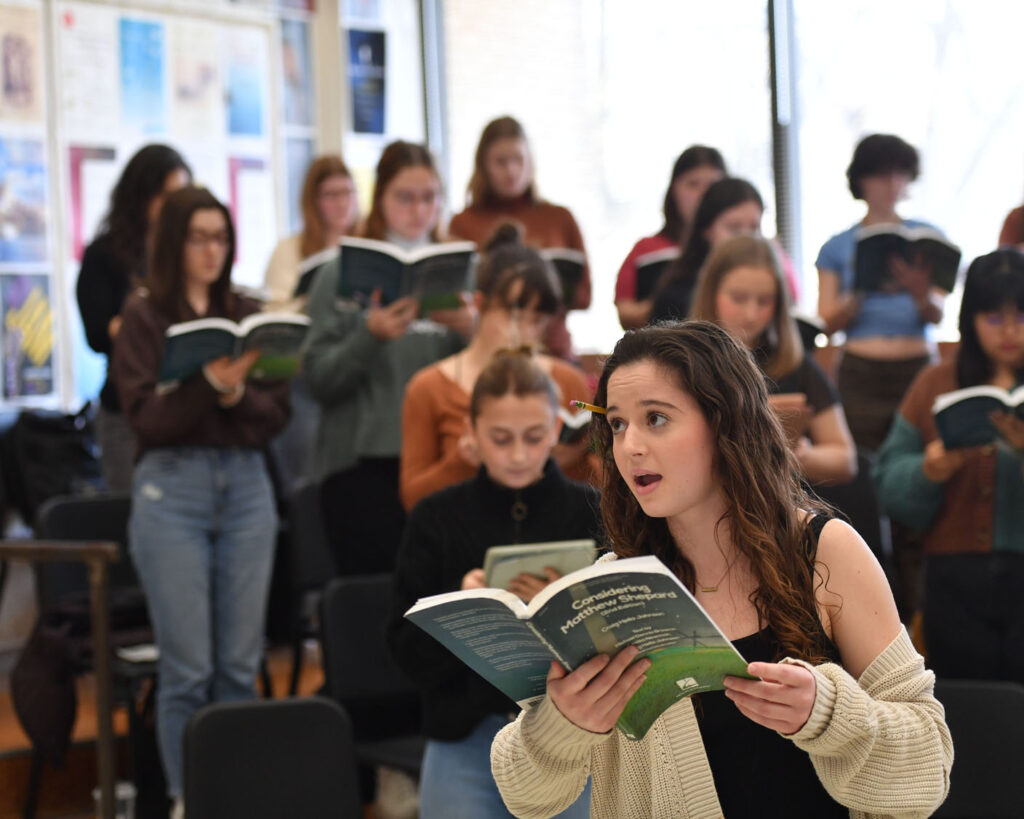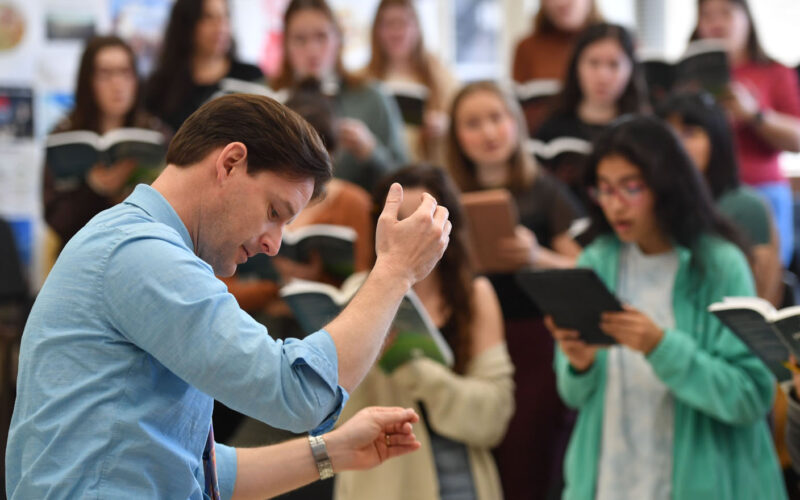BECCA MARTIN-BROWN
bmartin@nwaonline.com
On Oct. 7, 1998, Matthew Shepard, a 21-year-old student at the University of Wyoming, was brutally attacked and tied to a fence in a field outside of Laramie and left to die. On Oct. 12, he succumbed to his wounds at a hospital in Fort Collins, Colo.
Those facts are the basis for “Considering Matthew Shepard,” 263 pages — about an hour and 45 minutes — of music and spoken word that tells the story of how being gay cost Shepard his life.
Since his death, Shepard’s parents and the Matthew Shepard Foundation have worked to “pioneer the country’s first federal hate crimes legislation with the passing of the Matthew Shepard and James Byrd Jr. Hate Crimes Prevention Act in 2009; provided hate crimes training to 1,060 law enforcement officers and 76 prosecutors since May 2017; created dialogue about hate and acceptance within communities around the world; and built a robust collection of resources to support ‘The Laramie Project’ and other legacy works inspired by Matt’s story.”

Although the play “The Laramie Project” is better known, Stephen Caldwell, director of the University of Arkansas’ premier vocal group, Schola Cantorum, has known about “Considering Matthew Shepard” since its debut in 2016. Composer Craig Hella Johnson says he “wanted to create, within a musical framework, a space for reflection, consideration and unity around [Shepard’s] life and legacy.”
This year marks the 25th anniversary of Shepard’s death, but Caldwell wasn’t waiting for that landmark.
“I would have programmed [‘Considering Matthew Shepard’] already but for the pandemic, which disrupted concerts for us,” he says. “It is incredible music, it tells a story that everyone should know, and despite the tough subject matter is ultimately an uplifting piece about love and acceptance — two things our society needs.”
Perhaps surprisingly, the choice has not been met with only those two emotions.
“I told the students in August what our spring semester would be like, and in November I sent them the libretto and recordings to peruse,” Caldwell explains. “I was hopeful that all students would be on board for the performance, but I was wrong.”
According to Caldwell, several students “decided that they couldn’t sing the work as a matter of personal faith, and so left the group as a result.”
“All of the remaining singers agreed to begin the semester, and therefore begin their ‘consideration,’ with the shared belief that Matthew Shepard didn’t deserve to be murdered,” he says. “My goal isn’t to push a narrative on them, my goal is to tell the story and let them come to their own conclusions.
“Most of our students now were born after 1998, so this event did not occur in their lifetime,” Caldwell goes on. “They did not know who Matthew Shepard was, but they all knew about the Pulse Nightclub shooting, and the more recent Club Q shooting in Colorado. The music is difficult, and the score is long, but the students in Schola Cantorum rolled up their sleeves and got to work. They come to rehearsal each day with an open mind, an open heart, and ready for the challenge.”
“When I first heard about this piece of music, I had no idea what it was,” says Summer Matlock, an alto from Bentonville. “When Dr. Caldwell first explained the piece and its significance, I was excited that we were doing something that is incredibly applicable outside the classroom. I love choral music, but a lot of the older music doesn’t have pertinence to social issues that are happening today.”
“It’s true that some people have chosen not to participate in this concert, but the large majority of choir members are enthusiastic about it and are pouring themselves into the music,” says Clayton Davis, a second-year tenor from Los Angeles, majoring in jazz. “Matthew’s story deserves to be told and his life celebrated.”
Caldwell says even with the subject matter, “Considering Matthew Shepard” is beautiful music — a “fusion” of styles from a country ballad to gospel blues, “a movement set to early shape-note style, a movement like a German chorale, Broadway, jazz, etc. The work fuses many uniquely American styles together to tell the story of a unique American.”
“This is pretty music. But pretty is subjective,” Caldwell says. “When confronted with that argument” — that the choir should simply sing “pretty music” — “one must realize that the sentence is missing words. It really means ‘Why don’t you just sing music that I THINK is pretty, on subjects I THINK are appropriate.’ … The same with book bans, etc.”
Caldwell says he has “told the students why [this music] matters to me, but I would never suggest why it should matter to them. That is for them to decide.” And they’ve had plenty of opportunities to think about it.
“As we’ve been rehearsing this piece, [certain] groups have come to our campus with signs, bullhorns, and pamphlets, screaming their hateful rhetoric at students. There is a movement in the work that depicts this, as the Westboro Baptist Church protested Matthew Shepard’s funeral. I watch the students walk past these protesters, only to come into class and then have to pretend to be one of them,” Caldwell says. “Those days are particularly intense rehearsals, with raw emotion on display. I am immensely proud of our students and what they have accomplished with this piece.
“My hope is that members of our community are brave enough to come hear it.”
FAQ
‘Considering Matthew Shepard’
WHEN — 7:30 p.m. April 15
WHERE — Faulkner Performing Arts Center on the University of Arkansas campus in Fayetteville
COST — $20 general admission; $10 students & seniors
INFO — uark.universitytickets.com










